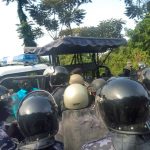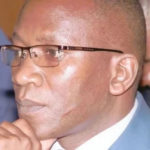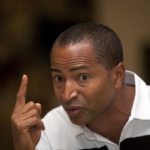By Mukalazi Deus Mubiru
Research Associate, Great Lakes Institute for Strategic Studies (GLISS).
Since 1996, every time Uganda approaches an election period, talk of opposition fielding a joint candidate, to defeat candidate Museveni, comes up. In the 1996 presidential elections, UPC and DP fronted Dr Paul Kawanga Ssemogerere under the Inter-party Cooperation. In 2001, the Opposition rallied behind Dr Kizza Besigye under Reform Agenda. In 2016, there were attempts to field one presidential candidate to face Mr Museveni under The Democratic Alliance (TDA) but this collapsed because the Opposition political parties once again failed to agree on who should be their joint candidate.
In the run-up to the 2021 elections, there was talk and efforts to have a joint presidential candidate. In principle, all the leading players like Rtd Col Dr Kiiza Besigye of People’s Government, Amuriat of Forum for Democratic Change (FDC), Nobert Mao of Democratic Party (DP), Mugisha Muntu of Alliance for National Transformation (ANT), Robert Kyagulanyi of National Unity Platform (NUP) among others hinted on the need to present a joint candidate. However, just like in 2016, there was no agreement and all parties fielded Presidential candidates.
While appearing on the weekly political talk show, the Front Line, on NBS TV on the night of Thursday, March 5, 2021, the Secretary-General of the FDC, Hon Nathan Nandala Mafabi, at the risk of sounding tribalistic and sectarian, applauded Buganda for showing the rest of Uganda on how things should be done by overwhelmingly voting Hon Robert Kyagulanyi for President and NUP Candidates for Member of Parliament and Local Government. In the same spirit, he blamed the Acholi, Easterners and people of Ntungamo for neglecting their own, that is Nobert Mao, Patrick Amuriat and Mugisha Muntu respectively.
Hon Nandala’s statements re-open a debate that is yet to be resolved. Do we need an alliance of -pro-change forces in Uganda if we are to realize a peaceful transition of power and get rid of Museveni who many people believe has overstayed his welcome or parties should focus on creating regional niches and support thereby weakening the National Resistance Movement (NRM) of President Museveni?
In August 2020, the Uganda Governance Pulse, a Public Perception Survey on governance indicators in the country produced its maiden report. The survey had interesting data which showed how different sub-regions were likely to vote in the 2021 presidential elections. Then, as per the surveyed people, the race was between three top contenders: Yoweri Museveni, Kyagulanyi Sentamu and Kiiza Besigye. The survey showed that Yoweri Kaguta Museveni would win the presidency but with 47 per cent which would deny him the constitutionally required 50 per cent plus 1 vote to win. In the same survey, Kyagulanyi came second with 22 per cent and Besigye came third with 17 per cent. According to the poll, Kyagulanyi had strong support in Buganda and Kampala with considerable support in Busoga, Bugisu, Bukedi and Sebei. Museveni had support in the rest of the sub-regions with his strongest support base being Bukedi, Lango and Tooro at 65 per cent. Kiiza Besigye did not command overall support in any of the regions but it’s important to note that he had more support than Kyagulanyi in Ankole, Kigezi, Bunyoro, Tooro and Rwenzori regions or what one can sum up as the Western region.
It’s possible that Besigye’s dwindling support in Buganda (his hitherto stronghold) coupled with the belief that one strong opposition candidate is the way to go, might have contributed to his decision not to contest. Going by the announced presidential elections results, it’s evident that Besigye’s withdrawal from the race cost the opposition because as projected many opposition supporters in the Western region refused to embrace the strong opposition candidate in the race, Kyagulanyi. As a result, Museveni ended up consolidating his support in the region as evidenced in many areas like Rukungiri which overwhelmingly voted for him.
There is an iota of truth in what Nadala argued, as evidence by the good performance of Patrick Amuriat in the Teso sub-region. Although the region was won by Museveni at 56 per cent, Amuriat’s a’s (FDC Presidential candidate) performance of 24 per cent beating Kyagulanyi at 16 per cent underscores the regional undertones that characterized the election. Amuriat scored a national average of 3 per cent. Similarly, Kyagulanyi’s dismal performance in the Western Region at 16 per cent shows the same trend.
However, the tribal and or regional approach as suggested by Hon. Nandala suffers a setback when you look at the performance of Nobert Mao in Acholi, Lango and West Nile as well. Also, Amuriat’s performance in Bugisu, Karamoja and Sebei shows that voters will not vote for someone simply because he is “their own.” Generals, Tumukunde and Greggory Mugisha Muntu were shunned by the Westerners and Hon Robert Kyagulanyi performed better than them even in their own home districts of Rukungiri and Ntungamo respectively.
The performance of FDC candidates when it came to parliamentary elections also has lessons for political parties. Whereas the FDC Presidential candidate garnered a miserable 3 per cent overall and did not win even a single District, the party returned 34 Parliamentary candidates spread all over the country from Kabale to West Nile. The thinking that FDC and NUP would compete for space seems to be false as the results showed each party can actually develop a niche and compete favourably thereby stretching the NRM and Museveni indirectly.
It’s therefore important that political parties get on the drawing board and make multi-party politics possible in Uganda. As argued by Mr Godber Tumushabe, the associate director at Great Lakes Institute for Strategic Studies (GLISS), opposition parties, are fighting against a very entrenched dictatorship. Museveni has captured all state institutions. A political coalition will not make any difference. The political parties have their differences and should focus on their internal democracy and getting a cause to fight for. As rightly put by Mr Mwabusya Ndebesa, now is the time for the opposition to build on mobilization gains from the election and be united in strategy to force Museveni and NRM to negotiate transition and handing overpower.







